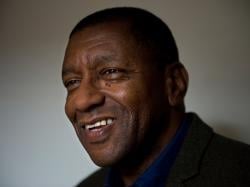
 Howard C. Stevenson, PhD - "If Elephants Could Talk: Racial Literacy for Healing Racial Stress in Relationships"
Howard C. Stevenson, PhD - "If Elephants Could Talk: Racial Literacy for Healing Racial Stress in Relationships"
Friday, March 29: 10:30 AM - 12:00 PM
Workshop
Description
This workshop will show participants how to address diversity related topics in a way that increases trust and engagement in racially stressful moments and encounters. We expect participants to learn a way of becoming more racially assertive to speak or act on their expertise before, during and after face-to-face (FTF) racial encounters without over-reacting or under-reacting to these moments. The goal is for professionals to engage rather than avoid racial encounters while following the reasonable and ethical duties of their roles and responsibilities. The workshop on racial literacy training will introduce a number of different racial perspectives about the same subject matter in an effort to demonstrate understanding different viewpoints can improve one's ability to respond accordingly. Through storytelling, journaling, stress management practice, debate, role-playing, open exchange and dialogue, participants will see how racial literacy can aid decision making while experiencing in-the-moment stress reactions.
Learning Objectives
- Learn about research on racial literacy and how the stress of racial/gender interaction, discrimination and dehumanization of the behaviors of youth of color can lead to disproportionate exclusion and misjudgment
- Learn how educators can engage Black youth and families in conflicts (through affection, protection, and correction) by embracing their coping styles as strengths not threats
- Learn about school-based culturally relevant interventions that use physical activity and racial to help youth resolve personal stressors that interfere with academic and social well-being
- Apply and practice racial literacy coping skills during personal and professional racial encounters (based on a model of racial socialization, literacy, and stress management) to improve cultural and racial competence
View full session information here.
About Dr. Stevenson
Dr. Howard Stevenson is the Constance Clayton Professor of Urban Education, Professor of Africana Studies, in the Human Development & Quantitative Methods Division of the Graduate School of Education at the University of Pennsylvania. He is the Executive Director of the Racial Empowerment Collaborative at Penn, designed to promote racial literacy in education, health, community and justice institutions. Backed by a 12 million grant from the Robert Wood Johnson Foundation and based at REC, Howard also directs Forward Promise, a national philanthropic office that promotes a culture of health for boys and young men of color, to help them heal from the trauma of historical and present-day dehumanization, discrimination and colonization.
He is a nationally recognized clinical psychologist and researcher on negotiating racial conflicts using racial literacy for independent and public K-12 schooling, community mental health centers, teachers, police and parents. Two mental health research projects funded by National Institutes of Health examine the benefits of racial literacy. The PLAAY (Preventing Long-term Anger and Aggression in Youth) Project uses basketball and racial socialization to help youth and parents cope with stress from violence and social rejection. Dr. Stevenson also co-leads the SHAPE-UP: Barbers Building Better Brothers Project which trains Black barbers as health educators to teach Black 18-24 year old males to reduce their risk of -- HIV/STDS and retaliation violence -- while they are cutting hair.
His recent best-seller book, Promoting Racial Literacy in Schools: Differences that Make a Difference, is designed to reduce racial threat reactions in face-to-face encounters. Howard’s research and clinical work have been funded by W.T. Grant Foundation, Annenberg Foundation, and the National Institutes of Mental Health and Child Health and Human Development. He is the father of two sons, Bryan and Julian.






